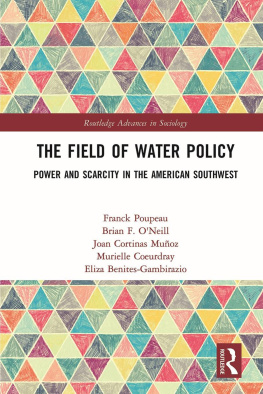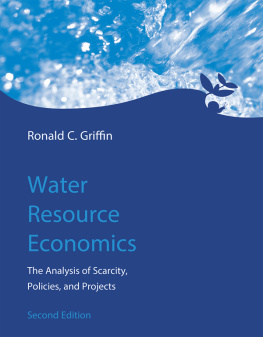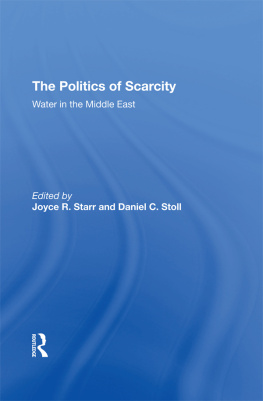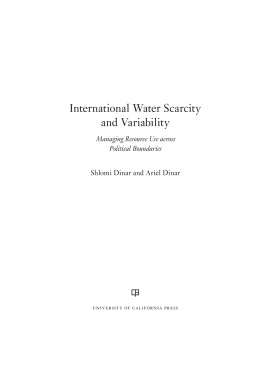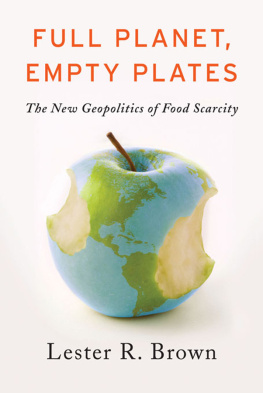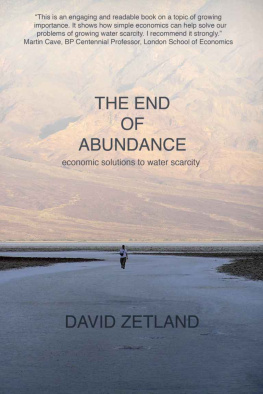The Limits to Scarcity

Science in Society Series
Series Editor: Steve Rayner
Institute for Science, Innovation and Society, University of Oxford
Editorial Board: Gary Kass, Anne Kerr, Melissa Leach, Angela Liberatore,
Stan Metcalfe, Paul Nightingale, Timothy O'Riordan, Nick Pidgeon, Ortwin Renn,
Dan Sarewitz, Andrew Webster, James Wilsdon, Steve Yearley
Animals as Biotechnology
Ethics, Sustainability and Critical Animal Studies
Richard Twine
Business Planning for Turbulent Times
New Methods for Applying Scenarios
Edited by Rafael Ramrez, John W. Selsky and Kees van der Heijden
Debating Climate Change
Pathways through Argument to Agreement
Elizabeth L. Malone
Democratizing Technology
Risk, Responsibility and the Regulation of Chemicals
Anne Chapman
Genomics and Society
Legal, Ethical and Social Dimensions
Edited by George Gaskell and Martin W. Bauer
Influenza and Public Health
Learning from Past Pandemics
Edited by Tamara Giles-Vernick and Susan Craddock, with Jennifer Gunn
Marginalized Reproduction
Ethnicity, Infertility and Reproductive Technologies
Lorraine Culley, Nicky Hudson and Floor van Rooij
Nanotechnology
Risk, Ethics and Law
Edited by Geoffrey Hunt and Michael Mehta
Resolving Messy Policy Problems
Handling Conflict in Environmental, Transport, Health and Ageing Policy
Steven Ney
Rationality and Ritual
Participation and Exalusion in Nuclear Decision-making
Brian Wynne
The Limits to Scarcity
Contesting the Politics of Allocation
Edited by Lyla Mehta
Uncertainty in Policy Making
Values and Evidence in Complex Decisions
Michael Heazle
Unnatural Selection
The Challenges of Engineering Tomorrow's People
Edited by Peter Healey and Steve Rayner
Vaccine Anxieties
Global Science, Child Health and Society
Melissa Leach and James Fairhead
A Web of Prevention
Biological Weapons, Life Sciences and the Governance of Research
Edited by Brian Rappert and Caitrona McLeish
The Limits to Scarcity

Contesting the Politics of Allocation
Edited by Lyla Mehta

London Washington, DC
First published in 2010 by Earthscan
Copyright Lyla Mehta, 2010
All rights reserved. No part of this publication may be reproduced, stored in a retrieval system, or transmitted, in any form or by any means, electronic, mechanical, photocopying, recording or otherwise, except as expressly permitted by law, without the prior, written permission of the publisher.
Earthscan Ltd, Dunstan House, 14a St Cross Street, London EC1N 8XA, UK Earthscan LLC, 1616 P Street, NW, Washington, DC 20036, USA Earthscan publishes in association with the International Institute for Environment and Development
For more information on Earthscan publications, see www.earthscan.co.uk or write to earthinfo@earthscan.co.uk
ISBN: 978-1-84407-457-0 hardback
ISBN: 978-1-84407-542-3 paperback
Typeset by Composition and Design Services
Cover design by Susanne Harris
A catalogue record for this book is available from the British Library
Library of Congress Cataloging-in-Publication Data
The limits to scarcity : contesting the politics of allocation / edited by Lyla Mehta.
p. cm.
Includes bibliographical references and index.
ISBN 978-1-84407-457-0 (hbk.) ISBN 978-1-84407-542-3 (pbk.) 1. Scarcity. 2.
Welfare economics. 3. Supply and demand. 4. Resource allocation. I. Mehta, Lyla.
HB846.L56 2010
338.521dc22 2010019662
At Earthscan we strive to minimize our environmental impacts and carbon footprint through reducing waste, recycling and offsetting our CO2 emissions, including those created through publication of this book. For more details of our environmental policy, see www.earthscan.co.uk.
Printed and bound in the UK by MPG Books, an ISO 14001 accredited company. The paper used is FSC certified.
For Wolfgang Sachs
Contents

Lyla Mehta
Lyla Mehta
Lyla Mehta
Nicholas Xenos
Betsy Hartmann
Lyla Mehta
Ben Fine
Fred Luks
Sajay Samuel and Jean Robert
Michael Thompson
Lyla Mehta
Nicholas Hildyard
Ian Scoones
Erik Millstone
Bruce Lankford
Jasveen Jairath
Dipak Gyawali and Ajaya Dixit
Lyla Mehta
List of Figures and Tables

Figures
Cultural categories of objects and the possible transfers between them
The three degrees of freedom and the five need-and-resource managing strategies
Nutrient depletion in Africa
Resource flow diagram, Wolayta, Ethiopia
US wheat prices, annual averages, 18661998
Scale and time acting on water sharing options
Supply and demand curves deemed to be in broad equilibria
Varying supply, demand and share management under a variable climate
Detail demonstrating modification of shares in a declining supply
A conceptual framework of scarcity response
View from plural rationalities: Abundance, scarcity or depletion?
Tables
Framework of supply management as a scarcity response
Framework of demand management as a scarcity response
Framework of share management
Comparing approaches for managing dynamic supply in sub-catchments
Four types of goods
List of Contributors

Ajaya Dixit
Executive Director
Institute for Social and Environmental Transition Nepal (ISET-N)
GPO Box 3971
Kathmandu
Nepal
adbaluwatar@ntc.net.np
Ajaya Dixit is an analyst of water resources and environment themes in Nepal and South Asia. He is the founder of Nepal Water Conservation Foundation (NWCF) and editor of Water Nepal, a journal addressing interdisciplinary water and development issues. He taught hydraulics and water resources engineering at Tribhuvan University's Institute of Engineering until 1989. He was educated at Regional Engineering College Rourkela, India (1977) and University of Strathclyde, Glasgow (1981).
He serves as chairman of the board of directors of Nepal Water for Health (NEWAH), a Nepali NGO that that has helped develop drinking water supply, sanitation and hygiene services to about 1 million people. He has written extensively on water resources, trans-boundary cooperation, flood management, environment and developmental issues and is the author of


